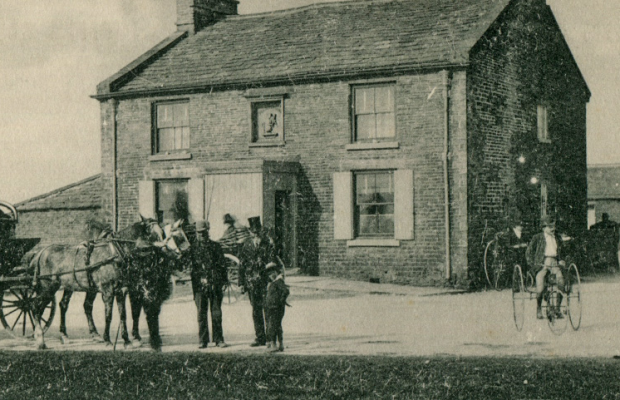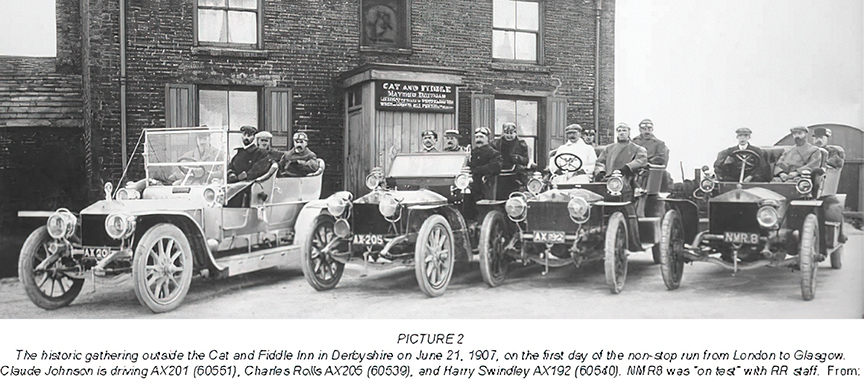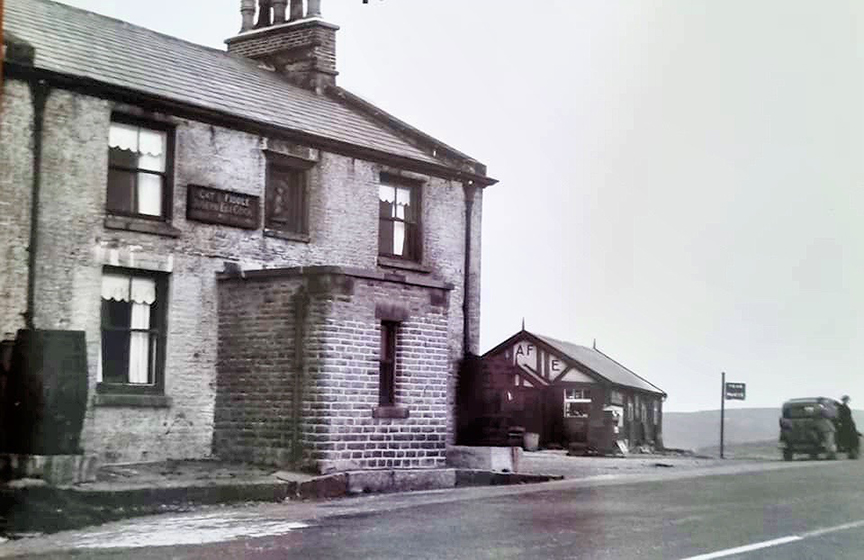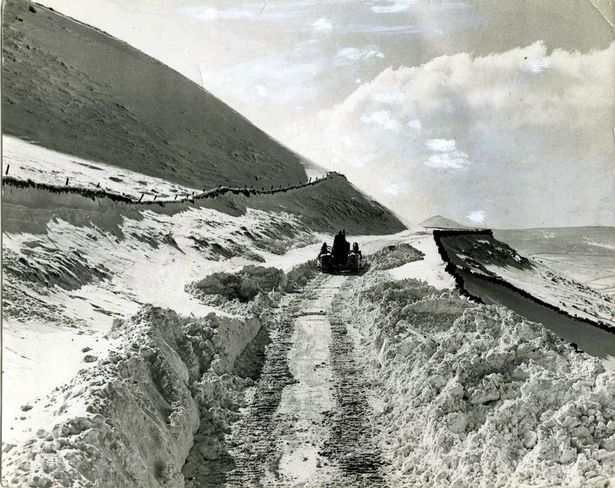- Home
- News
- What’s On
- Activities for Children
- Arts & Crafts
- Autos and Bikes
- Business events
- Car Boot & Auctions
- Charity events
- Churches & Religious
- Comedy
- Dance
- Days out & Local interest
- Education
- Exhibition
- Film
- Gardening & Horticulture
- Health
- Markets & Fairs
- Music
- Nature & Environment
- Spiritual
- Sport
- Talks and Discussions
- Theatre and Drama
- Business
- Local Information
- Jobs
- Deaths
- Charity events
- Contact Us
The Cat & Fiddle Inn

Sitting at the side of the A537, 1,689ft above sea level, it’s hard to miss The Cat & Fiddle.
Families from Macclesfield will have driven past it many times – along the A537 which connects Macclesfield to Buxton – but few will have heard of its varied and fascinating history.
The road itself is synonymous with some treacherous driving conditions when the winter strikes – so it’s not surprising that the inn has a few tales to tell.
These days it plays host to The Forest Distillery who teamed up with friends, family, supporters and the local community to safeguard its future.
Back in November 2019, a Crowdfunder raised more than £55,000 to assist the distillery and Robinsons Brewery to attempt to re-open the Cat & Fiddle as Britain’s highest altitude distillery.
It now provides take-out bottles, gifts, treats and hot drinks for walkers. Tables by the fireplace can also be booked.
However this just represents a new chapter in a long-story of one of the area’s highest venues.
Historian Dr Michala Hulme has delved into the archives to take a look at the fascinating history of the 200-year-old Cat and Fiddle Inn with the following report appearing in the Manchester Evening News:
As temperatures plummeted and snow and sleet blanketed the moors, Henry Critchley was forced to seek shelter in a derelict house.
The 18-year-old was making the arduous trip over the hills from Buxton to Macclesfield with two friends when the weather took a turn for the worse.
Undeterred, Critchley boasted to his pals that he could finish the journey alone.
Sadly, he had underestimated the extreme conditions.
His lifeless body was discovered the following day by a carter, close to the Cat and Fiddle Inn.
It was the first, but by no means the last, tragedy to strike the landmark pub.
Records are conflicting, but the Cat and Fiddle had probably opened 15 years earlier in 1826, three years after the road to Buxton was complete.
It was built by a local silk merchant named John Ryle, who bought the plot of land because it was next to the new turnpike road.
But it appears that Ryle only owned the property for a few years, as in 1831, it was put up for auction.
Fast forward 40 years and the publican is now 36-year-old Joseph Trueman and his wife, Elizabeth.
The family’s time at the Inn was marred with tragedy.
In 1871, the couple’s five-year-old daughter Frances Ann died of ‘congestion of the brain’.
She would be the first person to be buried in a family plot in St Stephen’s Church, Macclesfield Forest.
Eleven years after the death of Frances, the family went through more heartache when, in 1882, Joseph Trueman took his own life.
He was found by the servants hanging from a rope in one of the outbuildings.
Joseph was reported in the press as a popular man and was widely known as the pub’s landlord.
He was buried alongside his daughter.
Two years after Joseph’s death, the pub was in the press again; this time, it was because a local man named Isaac Coulston had been brought up at the Petty Sessions in Buxton.
His crime was taking passengers in his cab from Buxton to the Cat and Fiddle without a license.
He charged his passengers 1s. 9d each for the journey.
Knowing that he shouldn’t be taking passengers without a permit, he told his customers that he was only the driver and not the cab owner.
Coulston was refused a licence because he wasn’t a resident ratepayer. He was fined 10s. and costs was told that he must qualify for a license.
During the 1880s and most of the 1890s, Elizabeth Trueman was the publican of the Cat and Fiddle.
Following the death of her husband, she was in charge of both the pub and the farm.
While Elizabeth Trueman was still living at the inn, a young couple named Georgiana Martin and Matthew Beetham married in a suburb of Manchester.
A few months after the wedding, the couple left England to start a new life in Australia. They settled in Sydney and Queensland, where they welcomed two girls: Ethel and Ella Annie.
They stayed in Australia until 1896, when Georgiana decided to travel back to the UK.
She made the 75-day journey with her two young daughters, arriving back on October 15, 1896.
Matthew returned three years later.
Sometime between 1896-1901, 48-year-old Matthew Beetham and Georgiana took over the running of the Cat and Fiddle.
The 1901 census reveals that the couple lived there with their two daughters, who worked as barmaids, and a groom named Albert Wilshaw.
The couple left the pub sometime between 1911-1918 and moved to Staffordshire, close to Matthew’s family.
While the Beethams were still at the Inn, a flurry of activity occurred on the moors surrounding the Cat and Fiddle when an ‘inmate’ from the Macclesfield Asylum named Miss Armstrong went missing.
Miss Armstrong believed that she had no stomach and spent 15 days on the moors near the Cat and Fiddle without food.
She was found sleeping by a brook and claimed to be a ‘tramp’.
She was taken to Strangeways gaol, where her identity was confirmed and she was transferred back to the asylum.
In 1918, it was reported in the Times newspaper that the Cat and Fiddle was to close.
But it was saved after the Mayors of Buxton and Macclesfield spoke to the owner, a Misses Grimshaw of Errwood Hall, and they came to a ‘satisfactory agreement’.
That same year a long lease was taken out by Herbert Frood from Buxton, who was the inventor of the brake pad.
He stated that after the war, he was going to rebuild the Inn along the lines of a Swiss chalet, providing ‘first-class accommodation for motorists and residential visitors’.
When Frood advertised the tenancy, he had over 400 applicants, eventually awarding it to W. Kinghorn of the Wheatsheaf Hotel, Macclesfield.

see: http://www.ax201.com/history.html
The inn was never converted into a Swiss chalet; but, in 1925, the publican, Mr Cook, was granted planning permission to perform considerable alterations.
That same year, he spoke in the local press about the extreme weather, claiming that the snow during the winter months reached the top bedroom windows!
The licensee kept the group entertained with cards and gossip.
And in 1940, the pub was once again cut off from civilisation.




You must be logged in to post a comment Login